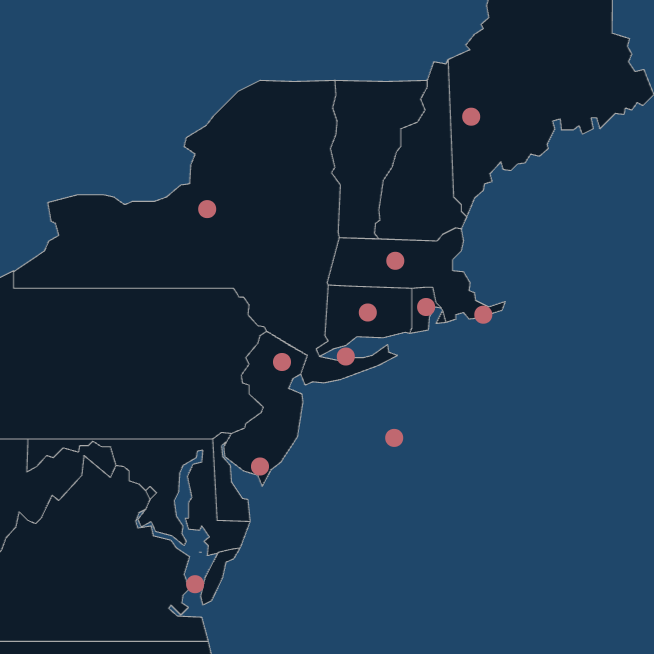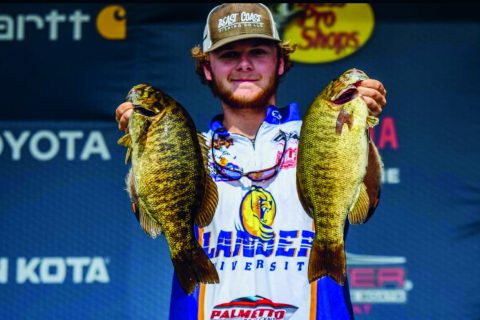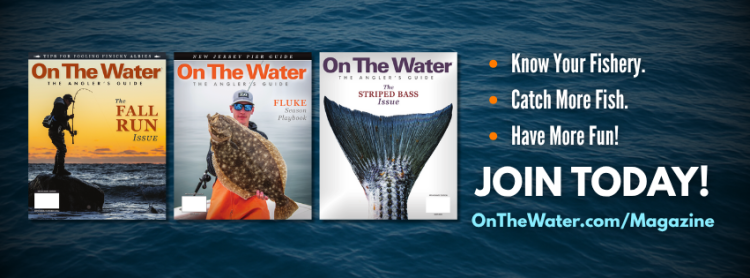The last event for the 2023 Major League College Fishing season was scheduled for late October on Lake Hartwell, which borders Georgia and South Carolina, and is arguably one of the top tournament destinations in the country. This lake had always seemed to get the best of my fishing partner, Cole, and me. It would be our last chance to qualify for the national championship so we devoted our time on the water to that lake, starting a month and a half before the tournament, spending multiple days a week practicing and trying to locate quality fish. The weekend before the tournament, we set up a campsite on the lake, which was both time and cost efficient. Sleeping in a tent and eating venison cooked over the fire got us through the week.

When the day came, we were the first to the ramp and blasted off to our spot and got straight to catching fish. As we made our rotation through different areas, we slowly picked off largemouth and spotted bass. By mid-afternoon, with our respectable five-fish limit filled, we knew we had a chance to win. We headed back to the boat ramp and weighed in 17 pounds, 1 ounce, which put us at the top of the leaderboard. We were an early boat number, so we watched more than 200 other boats weigh in their fish, not one of which topped our score. Being called back up on stage as the final team was surreal because this was the moment we had worked for. We were announced as the first-place team out of 250 boats and were handed our trophies and a “Happy Gilmore” check. Not bad for some school-sanctioned fishing.
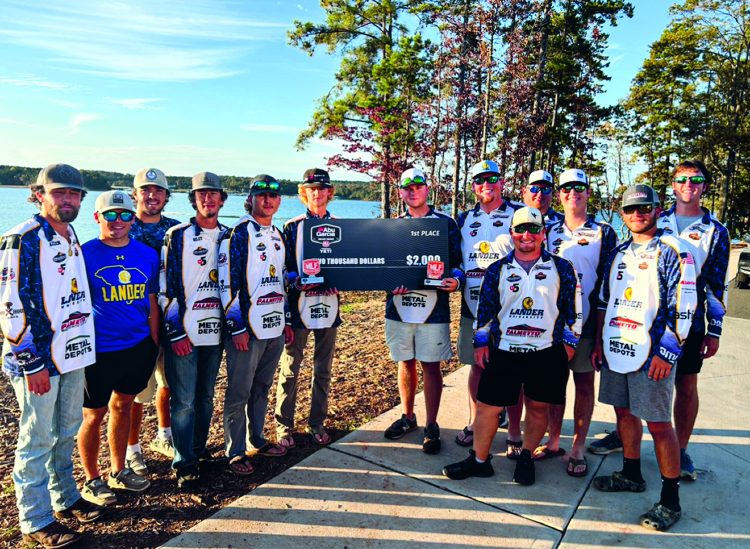
Learning and Growing
I grew up in Northfield, Massachusetts, and have always had a passion for the outdoors. It has completely consumed my life since I was about four years old. If it swam, I tried to catch it, and if it lived in the woods, I tried to hunt it. I became interested in fishing through my grandfather, who was an avid angler. We spent many weekends and evenings fishing throughout western Massachusetts. I started to consume fishing knowledge in any way I could, from magazines and books, DVDs, and the internet. As my infatuation shifted in the direction of bass fishing, its competitive aspect naturally followed.
I started fishing competitively with the Cheshire County Bassmasters out of Keene, New Hampshire, in the spring of fifth grade. I began as a co-angler, meaning I was paired up with an angler on his bass boat. These fishermen took me in as one of their own, even though I was 30 years younger than the next-youngest angler. I fished off the back of the boats, learning as much as I could while fishing every tournament possible.
I knew that more time spent targeting bass was the only thing that was actually going to make me become a better angler. While in junior high, my tournament partner and I joined a few local clubs to work on our skills and learn how to be more competitive in bass fishing. Fishing local tournaments every weekend was critical for pursuing bass fishing at a higher level.
Since I was from the western part of Massachusetts, I was not aware of the high school bass-fishing programs in the eastern part of the state until my junior year. At that point, I signed up to fish the Massachusetts Bass Federation high school trail and the Massachusetts BASS Nation high school trail. This is when I realized what competition was like within my age bracket. With multiple top 3 finishes during my first year in both trails, I set a goal on winning my senior season. Taking home a win and the Angler of the Year for the 2019 Massachusetts Bass Federation season was a turning point for me. I didn’t want to only fish for fun while I was at college, I wanted to fish tournaments for my college and challenge myself as an angler.
Discovering College Bass Fishing
Not many people are aware that college bass fishing exists, and the opportunities are offered across the country. Schools may have a club bass-fishing team or a bass team that is under the athletic department. Schools compete against each other, big and small. Three main organizations run national level college events: the Association of Collegiate Anglers bass fishing series, The Bassmaster College Series, and Major League Fishing College Series. These three trails offer the most points toward a team’s school-of-the-year ranking and average anywhere from 175 to 250 boats per tournament. There are also many smaller local trails and school-run trails that provide college anglers with dozens of chances to compete at multiple levels throughout a season.
I looked extensively at almost every established college fishing program and researched which schools offered bass-fishing scholarships that might be a good fit for me. I knew I needed to relocate for college and that the Southeast was where the heart of bass fishing was. Most of the top professionals are from this region (or relocate there), where the incredible fisheries offer 365 fishing days a year without having to winterize a boat.
I narrowed down my choices to three universities: Murray State University in Kentucky, Carson-Newman University in Tennessee, and Lander University in South Carolina. All the usual things that one looks for in a college were still important to me, such as dining options and the dorms; however, what I really cared about was how close the campus was to local bodies of water, popular tournament destinations, and what the overall region of the country could offer me as a competitive bass angler. A unique thing about all three of these universities is that they offer scholarships for anglers (no different than those for athletes attending a school to play baseball or football), an incredible opportunity for aspiring anglers to chase their dreams.
I spent a lot of time weighing my options at the three universities and was able to step foot on campus at Murray State and Lander. The moment I arrived at the Lander campus, I knew it was going to be my new home. It is located in the heart of spotted-bass country and in a more rural setting, while still having a good-sized student body, so it was perfect for me. I committed to Lander during my visit.
After wrapping up my senior year of high school, I spent most of my summer working construction since I knew that college (and college fishing) weren’t going to be cheap. In early August, I made the 17-hour drive to school, bass boat in tow. Before that, I had never trailered my boat more than a few hours to the northern reaches of Lake Champlain, so that first drive down south with the Triton was surreal. I had no clue what the next four years had in store for me, but I knew that traveling the country to compete in bass tournaments was all I wanted.

Being a Team Player
As I became part of a college fishing team, I was in heaven. I was elected freshman representative for our team’s committee, and I vowed that I was going to try to leave the program better than I found it—to put our team in the best position to succeed on and off the water.
My first major collegiate tournament was the Bassmaster College event on Toledo Bend in Texas in 2019. I was a freshman full of expectations of simply showing up and doing great. After having a really good practice, I felt confident, but when the dust settled and the smoke cleared, I had only managed to weigh in 22 pounds over two days of competition for a middle of the pack finish. It was humbling, but I learned that I was going to have to devote my whole life and all my time and resources, to be successful fishing against my peers in college.
In my sophomore year, I was elected vice president of the Lander University Fishing Team. During that year, the team president and I were able to implement new management practices that resulted in a great tournament season. Lander University took notice of our growth and success, moving us from being a club sport to an official athletic sport. Since this shift, I have been a team captain and do everything in my power to support our team.
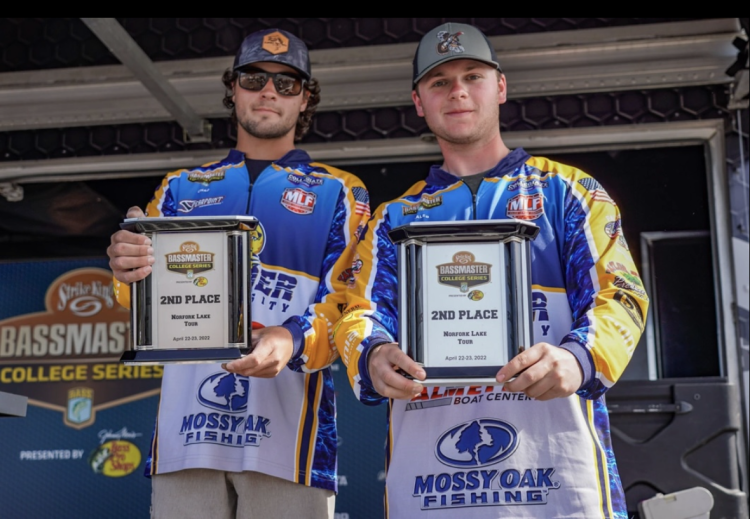
I have had three separate fishing partners over my time on the Landers Fishing Team. My first season partner was a local angler from South Carolina. My next partner was from Texas. His unique expertise from his waters combined with mine from the Northeast allowed us to really break down bodies of water and have great finishes in our tournaments. He graduated in May 2023, and I then partnered with Cole Moulton from New Hampshire. Cole and I had formed our friendship throughout his very impressive high school career that led him to fish for Lander as well. We have found great success with our similar fishing styles and mindsets.

The Northeast Advantage in College Bass Fishing
Growing up fishing every chance I got and tournament fishing in the Northeast uniquely prepared me for almost every situation I have found while fishing new bodies of water across the country. Experiencing the Northeast’s unique variety of fisheries, from deep, clear waters for smallmouth to dark, tannic, swamps for largemouths has made it possible for me to diversify my skill set.
The biggest advantage that I have found coming from the Northeast is the presence of grass in a vast majority of our fisheries. Surprisingly, most places I have traveled to do not have aquatic vegetation. When I do go to tournament locations that have grass, I feel right at home.
Chasing the Dream
College fishing has taught me a lot about myself as well as what it is like to chase the dream of fishing for a living. I got a taste of that dream when Two Toyota Tundras carrying 12 collegiate anglers rolled out into the grand arena of the Bassmaster Classic in Knoxville with music and lights blaring to the roar of the crowd. It was the top moment of my college fishing career, I was one of the lucky 12 competing in the Bassmaster College Classic in conjunction with the Bassmaster Classic at Watts Bar Lake in Tennessee. Bassmaster invites the first and second place finishers from the previous seasons qualifying events. Going backstage at the Classic, rolling through the arena, and weighing in bass in front of tens of thousands of people was the top moment in my college fishing career.
I plan to continue my angling career after college and compete in as many high-level tournaments as time and funds allow. Pursuing a major in business alongside being on a college fishing team, has also opened the door to me for many opportunities within the fishing space beyond tournaments. I had the chance to do a consulting internship with a fly-fishing reel manufacturer and spent a season guiding for the top youth bass-fishing camp in the country. Now, I find myself writing for one of the magazines I have read for years that helped me get to where I am today. I owe it all to college fishing.

